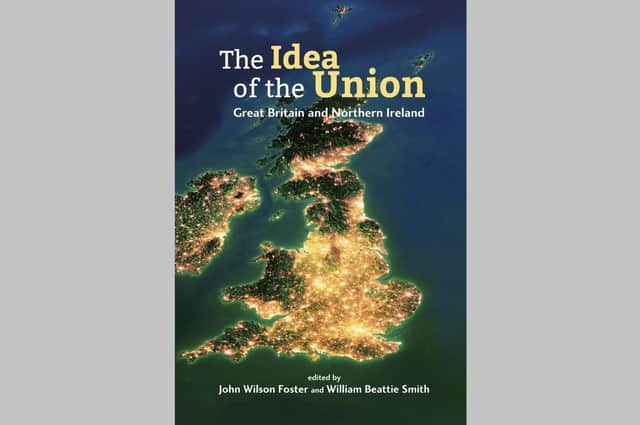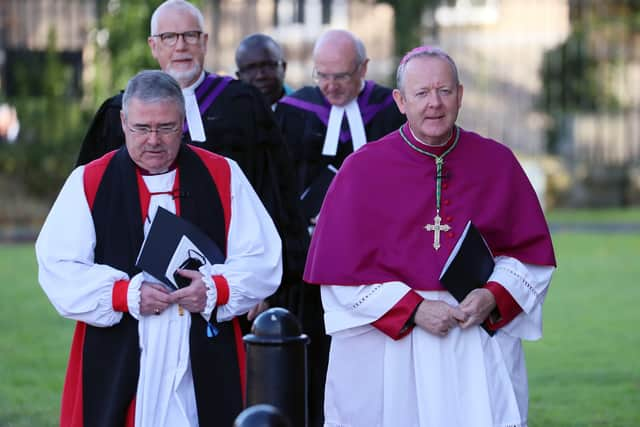We probe Irish nationalist myths in our new book, which defends Northern Ireland and the Union


Irish republicanism is marching through our public institutions, rewriting the political agenda, dominating debate and cancelling its critics.
It gives unionists no peace, driven by inherited dogma to politicise, every day, as much of our lives as possible. Its logic may be primitive and its morality skewed, but its ideas have been gaining ground in the media, the academy and the corridors of power.
Advertisement
Hide AdAdvertisement
Hide AdDevelopments over the past four years have diluted or endangered the Union: Sinn Féin’s collapsing of the Executive in 2017, its electoral advance in the Republic, divisions within the DUP and political unionism generally, and the British government’s careless creation of an Irish Sea border.


Since the Brexit referendum in 2016, the campaign for a united Ireland has been increasingly aggressive in electoral politics, in debates over rights, legacy and language, and in rewriting history to shift blame from republican terrorists to the British state. It has tried to foster the illusion that a united Ireland is progressive and inevitable, while the pro-Union cause is reactionary and hopeless.
Regrettably, there are many influential figures in the United States and Europe who have bought into this false narrative. While London is at best neutral on the Union, Dublin energetically endorses the prospect of a united Ireland.
Inside Northern Ireland, advocacy for the Union is no longer made on the campuses, in business, civil society or the mainstream media (with the laudable exception of the News Letter).
Advertisement
Hide AdAdvertisement
Hide AdThe recent ecumenical service in Armagh meant to commemorate the birth of Northern Ireland proved that even mainstream Protestant churchmen and churchwomen have lost their nerve, fearful to recall the achievements of Northern Ireland, including its immense industrial contribution to the war against Nazism, the revolutionary Education Act of 1947 and the pioneering NHS of 1948. And if these originated in Great Britain – that was, and is, the point of the Union!


Nor could the centenary service even commemorate — let us not mince words — the success of the anti-Home Rule campaign that saved northern Protestants, Jews, agnostics and atheists from what proved to be, as southerners belatedly acknowledged, decades of Catholic Church sway over government. Instead, the service deplored the partition that made the success possible.
Two of our historians set the record straight and debunk the myth that partition was foisted on an innocent united Ireland by perfidious England, when in fact it forestalled an all-island civil war.
The irony is that many of those who will not publicly and firmly subscribe to unionism actually do support Northern Ireland remaining in the United Kingdom. Absurdly, they are cowed by the thought of being considered bigoted, extreme or refusing to admit their guilt for their ancestors’ past sins, a thought republicans do not entertain.
Advertisement
Hide AdAdvertisement
Hide AdCommentators have rightly argued that republican success results from the passivity of unionism. Alex Kane, Gail Walker and others have reminded us how important it is for unionism to argue its case.


In April 2017, Arlene Foster promised “to bring people together from all walks of life and unionism to create a document entitled ‘the case for the Union’”. In October 2020, Peter Robinson called in this newspaper for a pro-Union think tank to provide policy analysis and advice for unionism’s elected representatives. The rest was silence.
Neither the influential audiences on which our future may depend nor those in NI who wish to stay inside the UK are hearing the unionist case loud and clear.
This was the urgent incentive for us to edit The Idea of the Union: Great Britain and Northern Ireland – Realities and Challenges.
Advertisement
Hide AdAdvertisement
Hide AdHere at last is the case for the Union of Northern Ireland and Great Britain spelled out by a score of eminent writers and scholars. Our contributors are historians, distinguished politicians, economists, legal activists, political journalists and cultural historians.
They include Daphne and David Trimble, Owen Polley, Mike Nesbitt, Graham Gudgin, Baroness Hoey, Arthur Aughey, Ben Lowry and Ray Bassett, former Irish ambassador to Canada.
The Union that our book explains and promotes (geopolitically, historically, culturally) is the whole Union of Scotland, Wales, England and Northern Ireland. Some of our contributors are Scottish or English. The editors and many of their contributors regard themselves as both Northern Irish and British.
Their rich dual existence is not a tribal “tradition” of bonfires and marching to be “accommodated” inside a 32-county Irish republic. Instead, it is an inalienable historical identity that the Ireland as imagined by Sinn Féin, Fine Gael or Fianna Fáil could not possibly accommodate: their Irish Ireland would not have the cultural storage space.
Advertisement
Hide AdAdvertisement
Hide AdWe and many of our contributors also regard themselves as Irish, of the island of Ireland. The real cultural coherence of the British Isles makes far more sense than a fantasy all-island republic separated from the rest of our North Atlantic Isles. Many northerners of a nationalist background would find their cultural lives constricted were they to live in a united Ireland shut out from the daily opportunities, benefits and possibilities of UK citizenship.
And if dual citizenship were on the cards, why then bother to pursue the will o’ the wisp of Irish sovereignty, and cause serious civic disorder while doing so?
It is the belief of several of our contributors that southern Irish acknowledgement of its considerable cultural Britishness would help allay the fears or quell the resentment of some northern nationalists. It would also be an acceptance of daily reality. The illusion of Irish economic and cultural independence, demonstrated in several of our chapters, cannot possibly justify a campaign, whether violent or peaceful, to annex Northern Ireland from the UK.
So unionism is not about retreat into the Wee Six but about outreach and ambition, participating in the new expansive United Kingdom forging worldwide alliances. In the new emerging order, the nationalism of small western nations is a shackle that the Republic of Ireland itself proclaims in its enthusiastic submission to the EU. That submission and the campaign to annex Northern Ireland are utterly incompatible.
Advertisement
Hide AdAdvertisement
Hide AdAmongst the important issues our contributors explore in some detail are the importance of east-west relationships; the implications of Brexit for Anglo-Irish relations; the Scottish dimension of the GB-NI Union; unionists’ perceptions of British betrayal; the facts behind allegations of unionist discrimination in housing between 1921 and 1973; republican attempts to rewrite the history of the Troubles during the scandal of legacy and twentieth-century Irish history generally; the case for ditching the EU protocol; a comparison between living standards north and south; and the way forward for unionism at Stormont.
• John Wilson Foster is an essayist, literary critic and cultural historian. He is Professor Emeritus at the University of British Columbia
William Beattie Smith is a former civil servant and author of ‘The British State and the Northern Ireland Crisis 1969-73,’ published by the US Institute of Peace.
They say: “The Idea of the Union has been funded through donations from friends and supporters, for which we the editors are grateful. In contrast to the relentless campaign for a united Ireland, our project has received no contributions from governments or their agencies, international foundations, research institutes or the taxpayer.”
Advertisement
Hide AdAdvertisement
Hide Ad• ‘The Idea of the Union: Great Britain and Northern Ireland’ is available for £12.99 through Blackstaff Press.
It is also for sale in Amazon and bookshops
• Other comment articles below and beneath that information on how to subscribe to the News Letter
• Ben Lowry Oct 30: The return of inflation will suit debtors and punish savers
• Owen Polley Oct 30: Unconvincing poll was twisted by pundits to support the NI Protocol
Advertisement
Hide AdAdvertisement
Hide Ad• Peter Robinson Oct 29: SF finance minister’s fiscal policy is to hold out his hand for more UK cash
• David Campbell Oct 29: We need to make plans for a proper celebration of NI at 100
• David Montgomery Oct 28: Put NI politicians at heart of the talks to resolve the dispute over the protocol
Advertisement
Hide AdAdvertisement
Hide Ad• Henry Patterson Oct 27: Terror is being legitimised in Basque Country as it is in NI
• Ruth Dudley Edwards Oct 26: Nasty article gloated over Sinn Fein centenary snub
• Owen Polley Oct 25: Unionists need to match the relentless energy of nationalism
• Henry McDonald Oct 23: Absence of Queen at centenary service was spun beyond credulity
Advertisement
Hide AdAdvertisement
Hide Ad• Ben Lowry Oct 23:Centenary church service should have celebrated Northern Ireland
——— ———
A message from the Editor:
Thank you for reading this story on our website. While I have your attention, I also have an important request to make of you.
With the coronavirus lockdowns having had a major impact on many of our advertisers — and consequently the revenue we receive — we are more reliant than ever on you taking out a digital subscription.
Subscribe to newsletter.co.ukand enjoy unlimited access to the best Northern Ireland and UK news and information online and on our app. With a digital subscription, you can read more than 5 articles, see fewer ads, enjoy faster load times, and get access to exclusive newsletters and content.
Visit
to sign up
Advertisement
Hide AdAdvertisement
Hide AdOur journalism costs money and we rely on advertising, print and digital revenues to help to support them. By supporting us, we are able to support you in providing trusted, fact-checked content for this website.
Ben Lowry, Editor